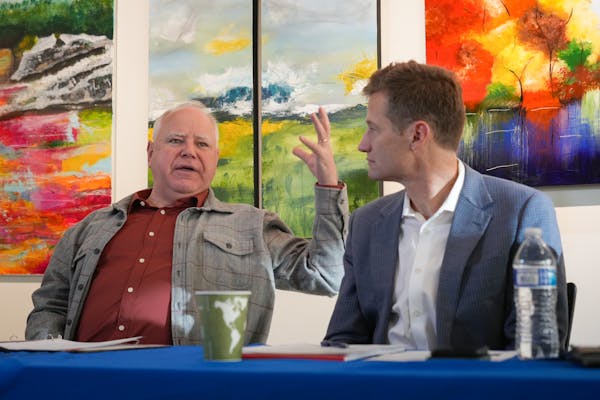Gov. Tim Walz said he felt a shift in voters' responses during the final two weeks of the 2022 campaign, one that made him think Democrats could have a better election night than pundits predicted.
That feeling became a reality, with Walz comfortably winning re-election and Democrats keeping control of the Minnesota House while unexpectedly winning back the state Senate from Republicans by a single seat. Heading into his second term in January, Walz said the paradigm has shifted after four years working with divided government.
"Things that I could not talk about — that they just said was a nonstarter — can now become the reality," Walz said in a wide-ranging interview with the Star Tribune. "The art of what is possible has expanded."
For the DFL governor, that means potentially "one of the most aggressive" proposals to address climate change in the nation, a sweeping statewide paid parental leave package and a push to legalize marijuana for adults. But Walz said he still wants Republicans at the table, and he anticipates he'll have some disagreements with members of his own party.
"People told me this: 'Be careful what you wish for; you're going to have to say no to your friends,'" Walz said.
Like last session, the governor plans to push for his tax rebate "Walz checks" for Minnesotans, as well as cutting Social Security taxes. Neither the DFL-controlled House nor Republican-led Senate included his direct checks in their budget plans last session. And not all Democrats supported the move to exempt Social Security income from state taxes, which was a top priority for Republicans.
"Seniors deserve relief as inflation and high energy costs continue to hurt their budgets, and we will hold Democrats, especially those who campaigned on tax cuts, accountable to eliminating the state's tax on Social Security benefits," said Sen. Mark Johnson, R-East Grand Forks, the chamber's incoming minority leader.
Walz harkened back to his 2018 primary race for governor, when he was a congressman from southern Minnesota who was considered the moderate Democrat in the hunt. "I don't think a lot of that changed," he said. "I think I am progressive on the issues that matter."
He sees longtime progressive priorities such as a statewide paid parental leave package and robust action on climate change as top issues next session, using part of the state's anticipated surplus to help pay for those proposals. He supports codifying abortion protections into law, which legislative Democrats say could get quick action next year.
"I was very clear that climate change is an existential threat, it needs to be addressed. I was very clear that we need to fund education and we need to codify these things. The voters agreed," Walz said. "I think that gives us a responsibility — not a mandate — but a responsibility to move on that."
Minnesota lawmakers left a historic $9 billion budget surplus on the bottom line this spring after negotiations broke down on a package of tax cuts and new spending on classrooms, health care and public safety. State budget officials will give legislators an update on the state's economic forecast next Tuesday, which could expand or shrink the surplus.
Walz said he thinks a lot of pieces of last year's package "could still stand," including funding for communities for public safety needs and investments to help long-term care facilities handle staffing shortages.
He's still working on the budget he'll propose early in the year, before legislators get to work on their plan using the updated February forecast.
Having a budget surplus heading into 2023 boosts Walz's hopefulness about a productive session, and he wants to raise expectations that lawmakers won't go into overtime this year to complete work on setting the state's two-year budget. Voters want low drama and an on-time finish, he said.
"We don't need to be playing the game at the end of May," Walz said. "I think Minnesotans deserve us to get done what can be done — if we can't, close up shop and don't have these things hanging over us."
